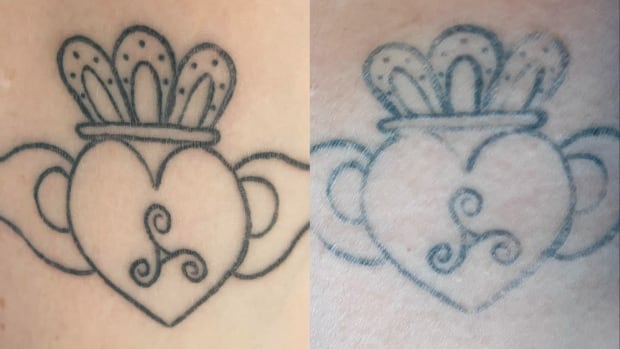As It Happens6:18Tattoos that will be ‘gone in a year’? Not so much, say regretful customers
A tattoo company that markets its ink as “made to fade” has come under fire from customers who say the tattoos are not as temporary as they’d hoped.
Ephemeral, a New York-based company founded by two chemical engineers, launched to the public in 2021 to much fanfare on the premise of real tattoos that are made to fade within nine to 15 months. It now operates studios in New York City, San Francisco, Houston, Atlanta, Miami and Washington, D.C
Their motto at the time was: “Regret nothing.”
“I do regret it,” Barbara Edmonds, whose tattoo is still visible after 18 months, told As It Happens host Nil Köksal. “I wish I had more information before I’d gotten it.”
Edmonds is one of several Ephemeral customers who say their tattoos have lasted longer than they’d expected, some as much as 22 months and counting.
When asked for comment, Ephemeral directed CBC to a letter on its website by CEO Jeff Liu.
“Ephemeral ink was designed to fade in about nine to 15 months, as determined by both pre-launch case and clinical studies,” it reads.
“Since our public launch in 2021, our team of chemical engineers has made a number of improvements to Ephemeral ink to implement your requests and feedback…. These improvements in tattoo vibrancy, placement, design and healing have led to more options, meaning more variability in fade durations by individuals.”
The company’s updated guarantee promises that 70 per cent of tattoos will fade in under two years, and they will all disappear eventually. The letter also promised “your money back” if a tattoo lasts for more than three years.
‘False advertising’
When Edmonds got an Irish Claddagh ring tattooed on her arm at an Ephemeral shop in August 2021, she didn’t expect it would still be there 18 months later.
The company’s website boasted at the time that it offered tattoos that would be “gone in a year.” That copy has since been updated to: “Tattoos that last at least a year. Not for life.”
“I first saw it in an Instagram ad. I’m somebody who is, like, a relatively anxious person. So I’ve always been interested in tattoos, but I’ve always been scared of the longevity, the pain, etc.,” she said.
“This seemed like a good way to sort of test my reaction to having something on my skin and test my reaction to the application process.”
More than a year later, it’s still there — albeit patchy and faded.
“It looks like a 70-year-old tattoo,” she said.
She did, however, sign a waiver warning the tattoo may take “shorter or longer” than nine to 15 months to fade, and could potentially leave “permanent marks.”
Edmonds admits she “shrugged off” the fine print, assuming it was just the company protecting itself legally from rare, worst case scenarios.
She says the company should have been more up front in its public messaging.
“I’m very lucky. No part of my life is somewhere where I can’t be seen with a tattoo. But I think that tattoos still have a lot of spaces in the world right now where they’re very stigmatized,” she said.
“It’s a serious enough product that I think that it needs to be a very transparent product.”
Laura Neilson, 41, of New York City, agrees. She had the word “reveal” tattooed on her wrist in April 2021, and while it’s somewhat faded, it’s still legible.
“Even though it says that the fade time is variable … they’ve been positioning their product publicly as tattoos that fade in a year. If they have a real, credible sense that the tattoos last longer than a year (and it seems they very much do now), then they need to stop advertising as such. That’s false advertising,” she said.
“I hope legal matters are taken against them — and in that case, I would gladly join in.”

Jeff Liu, the chief executive of Ephemeral, told the New York Times that its early marketing materials promising the tattoos would be “gone in a year” was “oversimplifying” the process.
Since then, he says Ephemeral has learned that “some customers will just take the initial tag line at face value,” and the company is now “more deliberate about how we drive home a message about variability.”
He said the majority of customers are satisfied with the results.
How does it work?
Regular tattoos involve injecting ink particles that are too large to be washed off with water or destroyed by the body’s immune system.
Ephemeral created “an ink particle that would … eventually shrink over time,” breaking down into “small enough sizes that our immune system can remove them,” co-founder Brennal Pierre, a chemical engineer, explained in a Reddit post.
Dr. Roy Grekin, director of the Dermatologic Surgery and Laser Center at UC San Francisco, told the San Francisco Chronicle that he’s not surprised Ephemeral customers experienced dramatically different fade times.
Tattoos — permanent or not — fade differently on different bodies, depending on a myriad of factors including age, placement, skin-care routine and contact with the sun.
“It’s just that no two people are alike,” he said.


